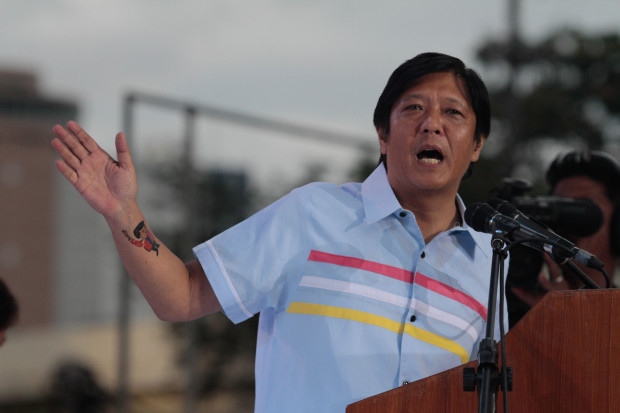The rise to the top of Sen. Ferdinand “Bongbong” Marcos Jr. in the vice presidential race has alarmed those who feel that it is their duty to remind the people of martial law’s dark side, when the senator’s father and namesake was at the helm of government.
On Thursday, the Presidential Commission on Good Government (PCGG) is launching at the University of the Philippines Visayas a caravan aimed at helping the youth better understand the abuses committed by the senator’s father, the late dictator Ferdinand Marcos, and his cronies during martial law years.
In Laguna province, teachers at the University of the Philippines Los Baños (UPLB) issued a statement assailing the Marcos family for what they called “an organized and willful distortion” of history.
Circulated in various departments, the UPLB teachers’ statement was signed by more than 100 faculty members as of Wednesday, said Dwight Diestro of the Department of Social Sciences.
In a telephone interview, Diestro said the statement was written by History teachers and was in line with a similar initiative from the UP Diliman campus in Quezon City.
Earlier, teachers from the Jesuit-run Ateneo de Manila University came up with a statement that scored the Marcoses for their denial of human rights abuses committed during martial law.
The PCGG caravan is carrying the theme “Remembering the lessons of the past as we journey the path toward good governance.”
It will feature historians, sociologists, martial law experts and PCGG officials who will talk to the youth about how it was like living through one of the country’s darkest eras and how the dictator, his family and cronies enriched themselves during their two-decade rule.
“[The speakers] will give firsthand stories of the martial law [era] and the victims of human rights violations, the excesses of the Marcos family and their cronies, and also the efforts of the commission to recover the ill-gotten wealth amassed by the family in the two decades of Marcos’ dictatorship,” the PCGG said in a statement.
For the pilot run at UP, PCGG Commissioner Vicente Gengos Jr. will lead the list of speakers.
Horror stories
The commission has also opened on the UP Visayas campus an exhibit featuring “martial law horror stories,” images of select pieces from the Marcoses’ Hawaii jewelry collection as well as of the missing paintings of world-renowned artists acquired by the Marcoses while they occupied Malacañang. The exhibit is open to the public until Friday.
“[The exhibit aims] to remind the present generation of these excesses and extravagance and what these public funds could have been [otherwise] used for,” the PCGG said.
Jewelry collection
Currently, the PCGG has an ongoing virtual exhibit of the Hawaii jewelry collection on its social media accounts that indicate the government projects that could have been funded if the money used for the jewelry pieces were put to good use.
The Hawaii collection is a set of around 300 pieces of jewelry seized by the US Customs when the family arrived in Hawaii following the toppling of the dictatorship in the 1986 Edsa People Power Revolution.
The PCGG is the custodian of the collection that is kept at the Bangko Sentral ng Pilipinas vault along with two other seized Marcos jewelry collections—the Roumelites and Malacañang collections.
The commission hopes that through the caravan, which would go around different universities nationwide to educate the youth as part of its 30th anniversary activities, it will be able to fulfill one of its mandates, which is to prevent corruption in government.
“The commission believes that it bears the responsibility of reminding Filipinos, especially the youth, of the real history … [as well as] the need to bring its message of good governance vis-à-vis the lessons of martial law to various academic institutions across the country,” it said.
It noted that through programs like the caravan, the post-Edsa generation would be made more aware of the PCGG’s work and “the responsibility of every citizen in learning the lessons of our history, combating corruption and contributing to good governance.”
Historical revisionism
“[H]istorical revisionism” is nothing new to the family of the dictator, the UPLB mentors said in their statement.
They cited, in particular, the dictator’s biography, authored by Hartzell Spence, which “fabricated” stories about the elder Marcos’ heroism during World War II.
“The new historical revisionism that the son of dictator Ferdinand Marcos has been framed in a similar motive,” they said.
“Sen. Bongbong Marcos and his camp are determined at sanitizing and distorting data, diluting context and omitting or erasing negative details of his father’s dictatorship so he can use a retouched version of history for his candidacy this year,” the statement read.
Not golden age
The teachers also slammed claims that the Marcos dictatorship marked the Philippines’ “golden age.”
They said 48 major industries were cornered by Marcos’ cronies during martial law. Foreign debt ballooned to $28.3 billion but loan proceeds were spent on “nonpriority” projects, like the mothballed Bataan Nuclear Power Plant.
On rights abuses, the UPLB teachers said more than 70,000 critics of Marcos were detained, 1,000 arrested, 34,000 tortured and 3,240 killed.
The succeeding administrations should also be held accountable for failing to prosecute the Marcoses for these atrocities, they said.
“The country should not forget the real and correct version of history. Most of all, the Philippines deserves leaders who are not liars,” the statement said. Reports from Jovic Yee in Manila and Maricar Cinco, Inquirer Southern Luzon
